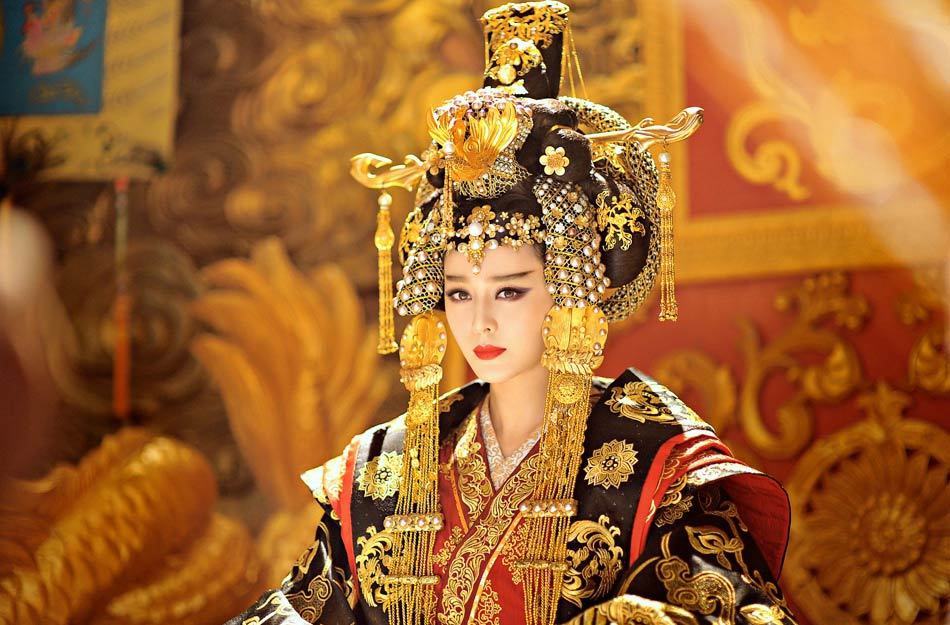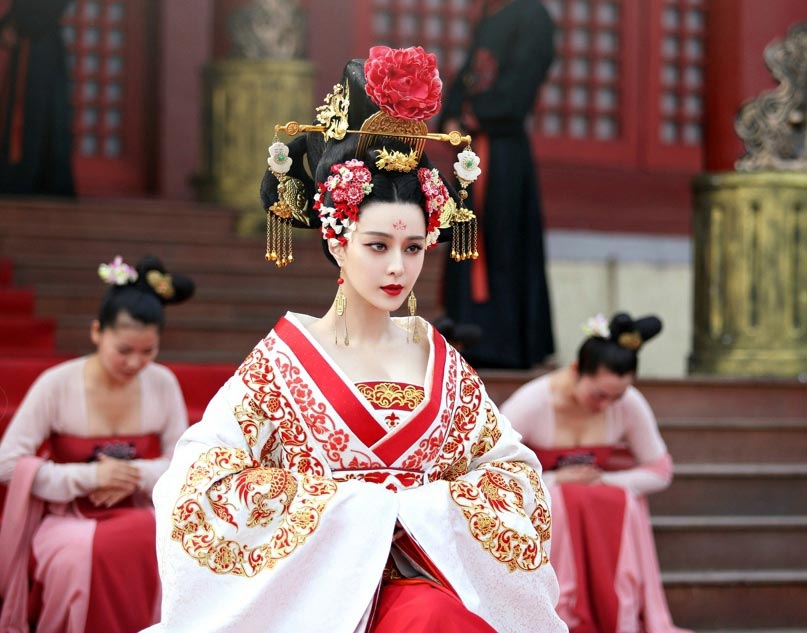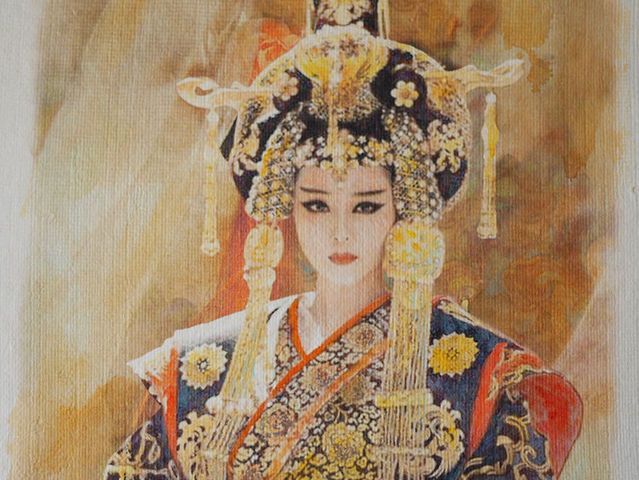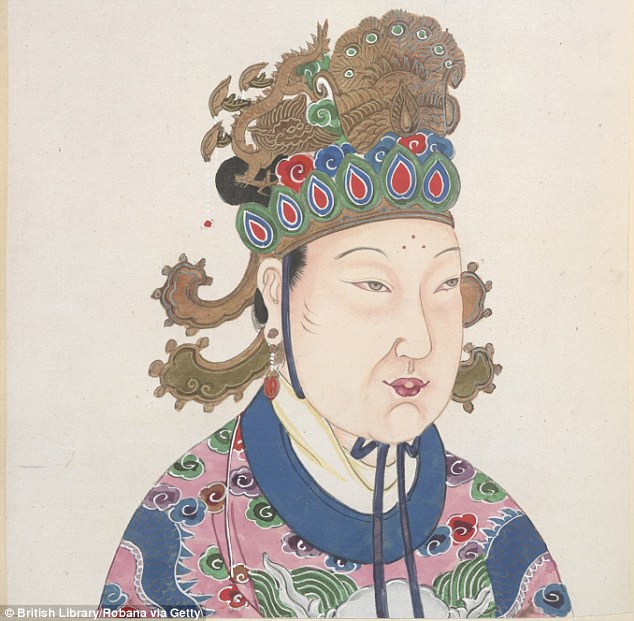The only queen in Chinese history to rise to power caused controversy for thousands of years that has yet to end.

Image of Wu Zetian in the 2014 Chinese TV series.
| Wu Zetian (602 – 705) was the only female emperor in Chinese history. She gradually replaced Emperor Gaozong of Tang to rule the government despite protests from her ministers. Wu Zetian is considered by the people to be the most cold-blooded and brutal emperor in Chinese history, next to Qin Shi Huang. This series of articles will tell the story of Wu Zetian and explore some aspects that are not mentioned by the people. |
Wu Zetian was a concubine of Emperor Taizong of Tang, Li Shimin, and later became Empress of Emperor Gaozong of Tang, Li Zhi. After many ups and downs in politics, Wu Zetian spent the last 15 years officially becoming the only queen in Chinese history.
Stories of Wu Zetian's crimes have been passed down from generation to generation. First, Wu Zetian framed the empress to seize power, then killed her son and the royal family, and gradually ascended to the throne. Wu Zetian's opponents are said to have met tragic ends.
These gruesome tales are all Chinese folklore. Scholars today still debate what really happened during Wu Zetian’s reign and whether she was the cruel, debauched emperor that people have made her out to be.
The only queen in Chinese history
Wu Zetian entered the palace to serve Emperor Taizong of Tang at the age of 14. According to the book Zizhi Tongjian by the historian Sima Guang of the Song Dynasty, once, Emperor Taizong of Tang took his concubines to see horses. Emperor Taizong joked: "Can any of you control it?"
None of the concubines dared to speak up, except for Wu Zetian. "Give me three things: First, an iron whip, second, an iron hammer, third, a dagger. If he doesn't listen, use the iron whip to beat him, if he doesn't listen, use the iron hammer to hit his head, if he is still stubborn, use the dagger to cut his neck." This detail shows Wu Zetian's strong personality.
After Emperor Taizong of Tang passed away, Wu Zetian was supposed to live in a nunnery, but she was favored by the Crown Prince Gaozong of Tang. Therefore, when Gaozong came to power, he welcomed Wu Zetian out of the nunnery and appointed her as Zhaoyi (second only to the Empress).
Not long after, Gaozong wanted to depose the empress and replace her with Zetian. This decision was opposed by many ministers in the court. With her strong personality, Wu Zetian naturally refused to stand by and watch.

Image of character Wu Zetian in Chinese TV series.
She secretly persuaded and negotiated with a series of high-ranking officials to support her as queen. "This is His Majesty's family matter, outsiders have no right to interfere," the book Zizhi Tongjian, page 200, recorded.
The words of the ministers helped Emperor Gaozong determined to make Wu Zetian the Empress.
With power in her hands, Wu Zetian turned to punish those who had opposed her. Some high-ranking officials had to choose death, while others were luckier and were only demoted or dismissed.
According to the book Zizhi Tongjian, Emperor Gaozong of Tang was seriously ill and handed over all the affairs of the court to Wu Zetian. Gaozong originally had no political views, and later listened to the court officials who accused Wu Zetian of abusing her power to depose the Empress.
But the incident quickly reached Wu Zetian's ears, causing the edict, although drafted, to never be issued. During the final days of Gaozong's court sessions, Wu Zetian always sat by his side to supervise. All major and minor matters in the court were only effective after the empress's approval.
In 683, Emperor Gaozong of Tang died. Wu Zetian successively placed her two sons on the throne, but both of these kings ultimately displeased her. Wu Zetian sought to depose Zhongzong and put Ruizong under house arrest, so that she could hold court herself as the Empress Dowager.
The event of Wu Zetian becoming the Empress Dowager to run the government caused three mutinies but were all defeated shortly after.

Sketch of Wu Zetian's image based on the TV series.
Later, when the court officials and more than 60,000 people agreed, Wu Zetian accepted to become emperor, established the Wu Zhou dynasty (690 - 705), and proclaimed herself the Holy Emperor.
Evaluation of Wu Zetian
China's Confucian culture did not allow a woman to ascend the throne, so Wu Zetian's claim to the throne was unprecedented. This explains why, when she replaced her husband as regent, Wu Zetian had to face three mutinies.
It was at this time that Wu Zetian established a special patrol group to arrest those who plotted or committed acts of rebellion. According to Chinese historians, it was true that this group tortured and killed those who opposed the Zhou Dynasty, but it is unclear how much role Wu Zetian played in supervising this force.
Some historians say the internal purge only served the interests of Wu Zetian, while others say it was also good for the people. So these two debates will never end, according to the website Rejected Princesses.
Regarding the story of her killing her own child, later scholars tend to explain that the child died from poisoning. But whether Wu Zetian took advantage of her children's deaths for her own benefit is still a big question mark.

Song Dynasty historians criticized Wu Zetian the most.
By the Song Dynasty, Chinese historians had an even more negative view of Wu Zetian. Because Confucianism never accepted a woman reaching the pinnacle of power.
In fact, in the Tang Dynasty at that time, there were also high-ranking officials who supported her, considering Wu Zetian a decisive person with the ability to govern the country. That was the reason why under Wu Zetian's reign, the people were still able to do business in peace, the country grew strong, and the chaos and power struggles in the court were only considered private matters.
During her short reign, Wu Zetian expanded China's territory, extending her influence to Central Asia, and eliminating the Goguryeo Kingdom in the north of the Korean Peninsula. Buddhism became increasingly popular. She considered economic development and maintaining domestic stability to be top priorities.
Chinese historian Sima Guang once commented on Wu Zetian in Zizhi Tongjian: “If she saw that a high-ranking official was incompetent, she would immediately dismiss him. The Empress Dowager had good observation and judgment, so all the talented people of the time had the opportunity to be used.”
Before his death, Chinese leader Mao Zedong often re-evaluated influential figures in Chinese history, and Wu Zetian was no exception.
“Wu Zetian was not a simple person. She had a wide range of knowledge and knew how to use people. But Wu Zetian also killed many people,” Mao Zedong once said, according to Best China News.







0 Comments